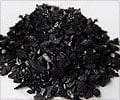Engineers at the Massachusetts Institute of Technology (MIT) say that they have created nano-scale carbon tubes that can act like a sensor to detect cancer drugs and other DNA-damaging agents inside living cells.
The researchers say that such sensors can prove helpful in detecting chemotherapy drugs as well as environmental toxins and free radicals that damage DNA."We've made a sensor that can be placed in living cells, healthy or malignant, and actually detect several different classes of molecules that damage DNA," Nature magazine quoted Michael Strano, associate professor of chemical engineering, as saying.
The study's authors point out that many chemotherapy drugs are very powerful DNA disruptors and can cause serious side effects, which is why it is important to make sure that they reach their intended targets.
According to them, tiny carbon nanotube sensors may help ensure that chemotherapy drugs are effectively battling tumours.
"You could figure out not only where the drugs are, but whether a drug is active or not," said Daniel Heller, a graduate student in chemical engineering and lead author of the paper.
The authors have revealed that the novel technology takes advantage of the fact that carbon nanotubes fluoresce in near-infrared light.
Advertisement
The interaction between the DNA and DNA disruptor changes the intensity and/or wavelength of the fluorescent light emitted by the nanotube, they add.
Advertisement
"We can differentiate between different types of molecules depending on how they interact," Strano said.
What makes these nanotube sensors safe for injection in living cells is the fact that they are coated in DNA.
The researchers have revealed that their future studies will use the sensors to study the effects of various antioxidants, such as the compounds in green tea, and learn how to more effectively use toxic chemotherapy drugs.
A research article on this work has been published in the online edition of Nature Nanotechnology.
Source-ANI
PRI/S














